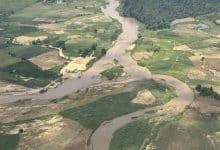Mekong River’s diverse fish populations face extinction threat

The Mekong River, a lifeline stretching almost 5,000 kilometres from the Tibetan Plateau to the South China Sea, is under grave threat. A recent report reveals that unsustainable development is severely endangering the river’s health and diverse fish populations. Consequently, one-fifth of the fish species in this Southeast Asian lifeline are on the brink of extinction.
The Mekong River plays a vital role in the farming and fishing activities of millions of individuals across six countries: China, Laos, Myanmar, Thailand, Cambodia, and Vietnam. However, the river and its fish populations are being threatened by habitat loss, agricultural conversion of wetlands, unchecked sand mining, introduction of invasive species, escalating climate change and the fragmentation caused by hydropower dams.
“The most immediate and potentially escalating threat is hydropower development,” stated Zeb Hogan, a fish biologist who leads the USAID Wonders of the Mekong, one of the groups involved in the report.
The report, a combined effort by the World Wildlife Fund and 25 global marine and wildlife conservation groups, pointed out that dams disrupt the flow of the Mekong River, alter water quality and obstruct fish migration.
Hydroelectric dams built by China have restricted the delivery of essential nutrients to tens of thousands of farms in the Mekong River Delta by blocking much of the sediment. The report, titled The Mekong’s Forgotten Fishes, states that close to 19% of the 1,148 or more fish species in the Mekong are on a course towards extinction. The actual number could be higher as the conservation status of 38% of the species remains uncertain due to insufficient knowledge.
The species threatened with extinction include 18 critically endangered species as per the International Union for Conservation of Nature. These include two of the world’s largest catfish, the world’s biggest carp and the giant freshwater stingray. The Mekong River is home to some of the largest and rarest fish species in the world, Hogan said.
The depletion of fish in the Mekong, which contributes to over 15% of the global inland catch yielding over US$11 billion annually, could jeopardise food security for at least 40 million people in the Lower Mekong basin who rely on the river for their livelihood, according to the report.
However, Hogan believes it’s not too late to reverse the adverse impacts on the fish population. If we take collective action to develop the river sustainably, there’s still hope, reported Bangkok Post.
Latest Thailand News
Follow The Thaiger on Google News:


























